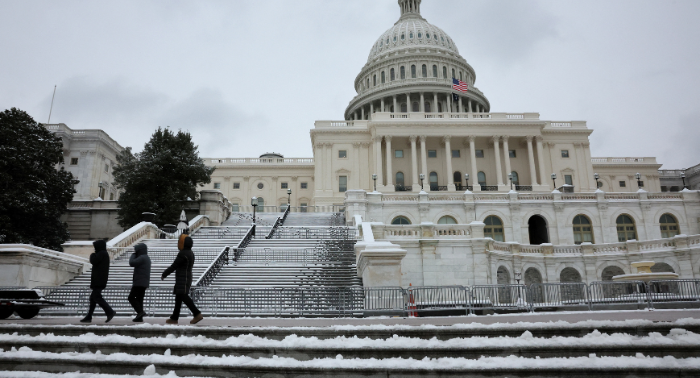The Senate is set to take action on Thursday to pass a temporary funding measure aimed at preventing a partial government shutdown, which would loom large if Congress fails to act within the next two days.
Both the Democrat-majority Senate and the Republican-controlled House have fallen behind in fulfilling their fundamental responsibility of funding the government for the fiscal year that started on October 1. In a race against time, lawmakers are striving to keep government operations running until early March, affording them additional time to pass a comprehensive budget for the full year.
Earlier this month, Senate Majority Leader Chuck Schumer, a Democrat from New York, and House Speaker Mike Johnson, a Republican from Louisiana, reached an agreement on a discretionary spending level of $1.59 trillion for the fiscal year ending on September 30. However, reflecting the deep divisions within Congress, the two parties now disagree on this figure, with Democrats asserting that the actual amount stands at $1.66 trillion.
Senator Raphael Warnock, a Democrat from Georgia, expressed optimism about the prospects of passing the temporary spending bill either on Thursday or Friday, stating, “I think we’re on a good path to getting it done.”
The intense negotiations between House Republicans, who advocate for significant spending reductions, and Democrats take place against the backdrop of a rapidly rising national debt, currently at $34.4 trillion. Concerns have arisen, in part, due to the substantial interest payments now shouldered by the Treasury Department.
This third stopgap funding bill, commonly referred to as a “continuing resolution” or “CR,” would essentially extend spending levels from the previous fiscal year until two upcoming deadlines on March 1 and March 8 for finalizing spending allocations for various government agencies.
Representative Josh Gottheimer, a Democrat from New Jersey, outlined the potential consequences of government agency shutdowns, which include exacerbating delays in veterans seeking disability benefits, potential suspensions of aircraft safety inspections, and freezes on Agriculture Department loans and other vital services for rural communities. Looking further ahead, over 1 million military personnel could temporarily go without paychecks.
Senator Susan Collins, a Republican from Maine and the senior Republican on the Appropriations Committee, expressed optimism that a government shutdown could be averted, stating, “I think we will take up the CR tomorrow.” However, she expressed frustration with the prolonged process of allocating funds for the 12 bills required to establish the full-year budget, remarking, “This has been dragging on for a long time, and I really don’t know why.”
Once the Senate approves the CR, it will proceed to the House, where Speaker Johnson may encounter resistance from staunch members of his party who oppose temporary funding measures without substantial spending reductions. It’s worth noting that such dissatisfaction led to the removal of Johnson’s predecessor, former Speaker Kevin McCarthy, a Republican from California, last fall.




